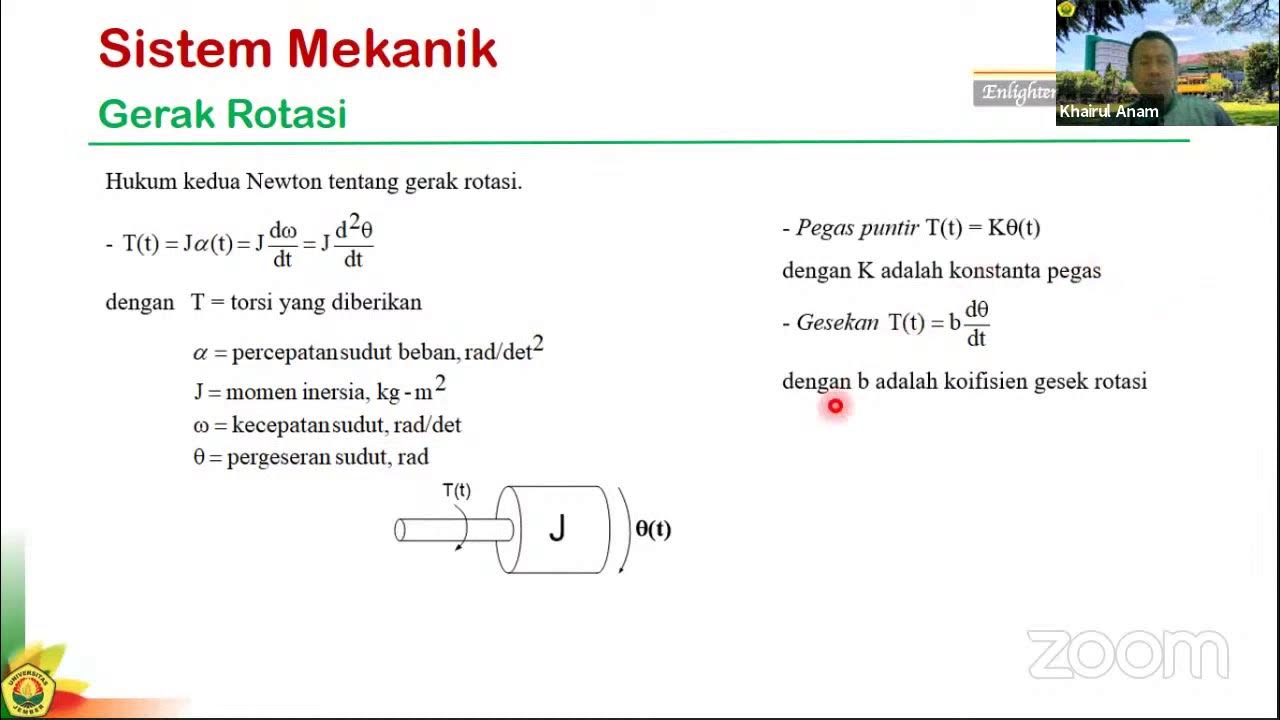This is why you're learning differential equations
Summary
TLDRThis video explores the importance of differential equations in understanding natural phenomena and real-world applications. It delves into how these equations model population growth, fluid dynamics, electromagnetism, and even the motion of orbiting bodies. The script uses examples from TV shows, gym exercises with chains, and the spread of the coronavirus to illustrate how differential equations describe complex systems. The video encourages viewers to learn more about these foundational mathematical tools through Brilliant's courses, which focus on practical applications.
Takeaways
- 📚 We learn differential equations because they describe how nature and the universe work, often appearing in complex systems like population growth, fluid dynamics, and electromagnetism.
- 🔍 Differential equations can be challenging to solve, but they provide valuable insights into various phenomena, such as modeling population growth or the movement of fluids.
- 🌐 Maxwell's equations, which are four fundamental differential equations, are crucial for understanding electromagnetism, the basis for technologies like phones, radio, Wi-Fi, and GPS.
- 🔑 Differential equations can be interpreted to find specific solutions, such as the unique curve that has an area under it twice the numerical value of its arc length over any interval.
- 📈 The script uses the TV show 'Numbers' to illustrate how differential equations can model real-world scenarios, such as the pursuit curve used by the FBI to predict criminal movements.
- 🚀 Pursuit curves are used in various contexts, including missile guidance systems and aircraft navigation, and are derived from differential equations considering the motion and direction of chasing and chased objects.
- 🏋️♂️ The video discusses the complex dynamics of exercising with chains, which involves a second-order nonlinear differential equation due to the changing mass as the chain is lifted.
- 🦠 The spread of infectious diseases like COVID-19 can be modeled using differential equations, which consider the rates of change in susceptible, infected, and recovered populations.
- 🌱 Population growth models, such as the SI model for infections, are simplified differential equations that help predict how diseases spread and can be controlled through various interventions.
- 🤖 The script highlights the importance of understanding the stories and meanings behind differential equations, which can be applied to a wide range of fields, from physics to biology and epidemiology.
- 🎓 Brilliant.org offers courses on differential equations that focus on real-world applications, providing a comprehensive learning experience for students and enthusiasts alike.
Q & A
What is the primary reason for learning differential equations according to the video?
-Differential equations describe how nature works and are fundamental in modeling various real-world phenomena, such as population growth, fluid movement, and electromagnetism.
Can differential equations always be solved exactly?
-No, differential equations are often tough and sometimes impossible to solve exactly, but they can still provide valuable insights into the phenomena they model.
What are Maxwell's equations, and why are they important?
-Maxwell's equations are a set of four differential equations that describe electromagnetism, which is fundamental to how phones, radio, Wi-Fi, and GPS work.
How do differential equations relate to the motion of objects in physical contact or in orbit?
-Differential equations describe the motion of objects when a force is exerted, whether through physical contact or gravitational force, as seen in orbiting bodies.
What is a pursuit curve, and how is it used in real-world scenarios?
-A pursuit curve is the path traced by one object chasing another. It can be applied in scenarios such as a cheetah chasing a gazelle or in missile guidance systems, aircraft, and submarines.
How do chains in gym equipment illustrate the complexity of differential equations?
-Chains in gym equipment add weight as the bar moves up, creating a scenario where the mass changes with height. This requires a second-order nonlinear differential equation to describe the motion.
What does the SI model represent in epidemiology?
-The SI (Susceptible-Infected) model represents the transition of individuals from susceptible to infected in a population, helping to predict the spread of infectious diseases.
How can differential equations model the spread of a virus like COVID-19?
-Differential equations can model the spread of a virus by describing the rate of change of susceptible, infected, and recovered individuals in a population over time, as seen in the SIR model.
What is the significance of population growth models in differential equations?
-Population growth models use differential equations to describe how a population grows at a rate proportional to its current value, incorporating factors like birth, death, and interactions between species.
How does the video illustrate the real-world application of differential equations in engineering and physics?
-The video discusses various real-world applications, including modeling the motion of rockets with changing mass, the spread of diseases, and the behavior of systems like beams and waves, showing the practical importance of differential equations in engineering and physics.
Outlines

هذا القسم متوفر فقط للمشتركين. يرجى الترقية للوصول إلى هذه الميزة.
قم بالترقية الآنMindmap

هذا القسم متوفر فقط للمشتركين. يرجى الترقية للوصول إلى هذه الميزة.
قم بالترقية الآنKeywords

هذا القسم متوفر فقط للمشتركين. يرجى الترقية للوصول إلى هذه الميزة.
قم بالترقية الآنHighlights

هذا القسم متوفر فقط للمشتركين. يرجى الترقية للوصول إلى هذه الميزة.
قم بالترقية الآنTranscripts

هذا القسم متوفر فقط للمشتركين. يرجى الترقية للوصول إلى هذه الميزة.
قم بالترقية الآنتصفح المزيد من مقاطع الفيديو ذات الصلة
5.0 / 5 (0 votes)






